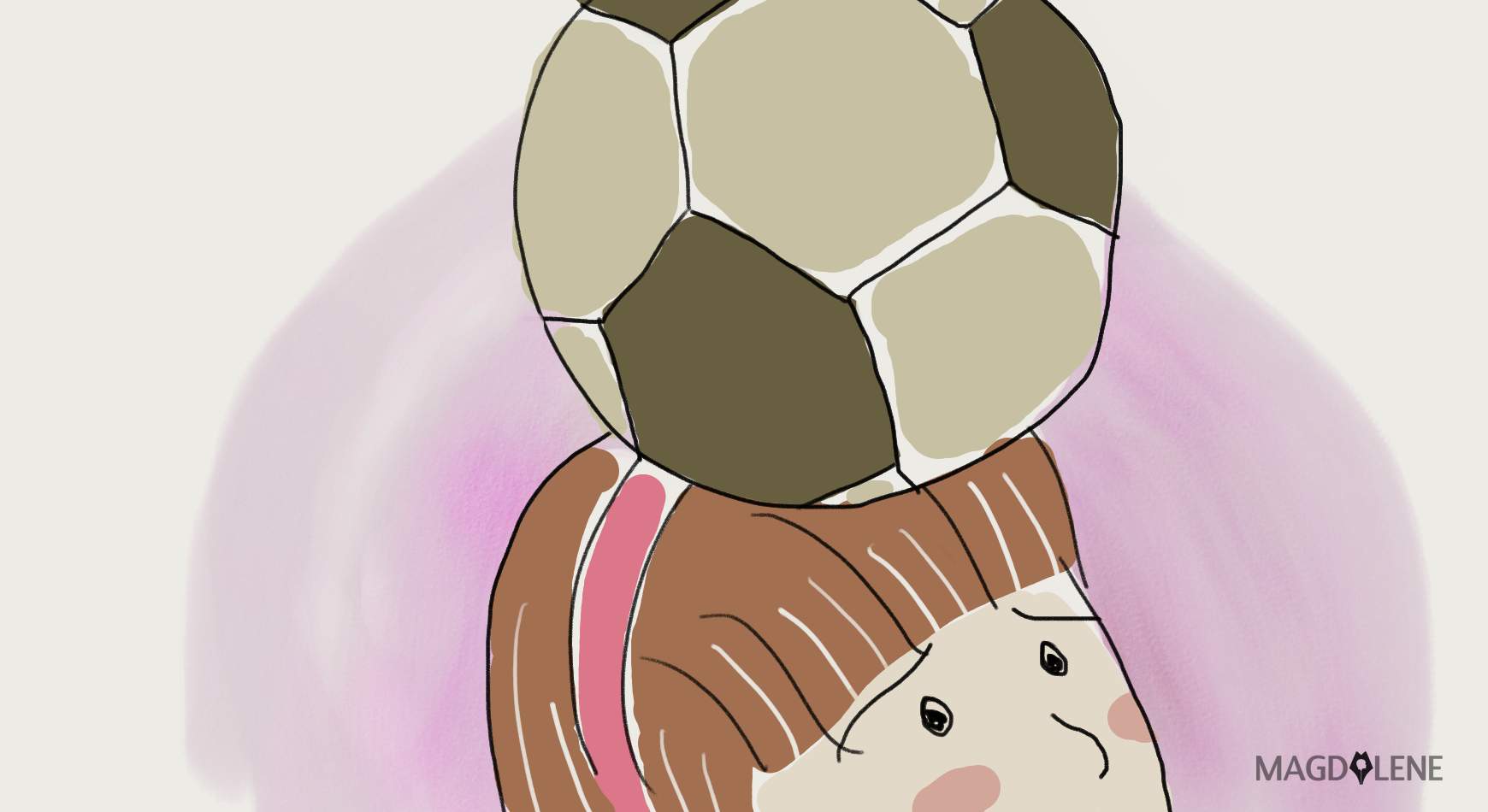Safe Sex for Teens: Lacking Education, Hindered by Stigma
*Trigger warning: Description of sexual violence, abuses, strong words*
At the age of 14, “Isabel” had sex for the first time while celebrating the second year of her relationship with “Anton”, who was three years her senior.
“My boyfriend’s family has two houses, so we had quite enough opportunities to do it (have sex). Sometimes we also borrow a friend’s apartment or rent a hotel. We are helped by his driver and a household assistant,” said Isabel who lives in Jakarta.
The couple usually used condoms when they were having sex, but occasionally they skipped it. As a result, Isabel had to take birth control pills that Anton gave her.
“At that time I only knew one consequence, pregnancy, and we agreed that if it were to happen, abortion was the way out,” she said.
Isabel said she never received sex education, neither at school nor from her parents. At that time, she did not feel the need to equip herself with information about safe sex from the internet or other reliable sources. Everything she knew about sex she learned from her circle of friends, most of whom were also friends of Anton, who has become her ex since 2020, or her older cousin who was also sexually active.
“Initially, I thought sex was normal for teenagers who were dating because all of my friends in our circle were sexually active,” she admitted.
Anton was not her only sexual partner. Now 18, Isabel has had sex with three other men. She had sex with them for different reasons, she said, from being “in a bad mood,” while on a break in her long-distance relationship with her boyfriend, while struggling with family problems, to “accidental”.
The latter had caused Isabel to become pregnant before she event turned 15. At the time, she did not even realize she was pregnant despite not having her period for three months since her cycles were also often irregular.
“At the time we were cooking in Home Economics class in school. There was a broken egg inside my apron and the smell made me nauseous, and I am usually not the type who gets sick from smell,” she said.
“To be honest, I wasn’t sure who the father was, because at that time I was under the influence of alcohol and ecstasy,” she said, remembering the events that led to her pregnancy in 2018. Accompanied by her mother and sister, she aborted the pregnancy in a hospital.
Lack of understanding about safe sex behavior as well as difficulty in accessing information or contraception is one of the factors pushing the number of teenage pregnancies, even in developed countries such as the United States.
In Magdalene’s recent online survey on sex education, 63 percent of 405 respondents aged 15-19 said they had received sex education, but only 12.8 percent thought the education they received was adequate.
As many as 84 percent of respondents say they obtain information about sexuality from the internet, and 16 percent of those who admit to consuming pornographic content said they did it to learn about sex.
Also read: The Importance of Forming a Family with a ‘Sex Positive’ Perspective
Culture-Friendly Sex Education
In some countries, sex education has succeeded in reducing the number of unwanted pregnancies and sexually transmitted diseases. In the Netherlands, Statistics Netherlands (CBS) shows that the number of young mothers decreases every year. In 2016, 1,492 teenage girls gave birth, down from the previous year’s 1,570 teenagers.
Instead of conveying stigma, fear, and taboos, the curriculum in the Netherlands’ school system focuses on empowerment, love, and respect. The Netherlands teaches comprehensive sex education to children as young as four. They are invited to discuss their feelings and how to be male and female with the aim of having an honest and open conversation about love and relationships. In addition, the material is packaged in such a way as to demonstrate sexuality that values respect, intimacy, and security. Between ages seven and eight, children learn proper names for body parts and discuss gender stereotypes. At the age of 11, they discuss reproduction, safe sex, and sexual harassment.
The Global Reproductive Health considers the Netherlands’ system to be effective, as average teenager in the Netherlands does not have sex at an earlier age than in other European countries. Moreover, they tend to have a positive first sexual experience and use contraception.
The same curriculum is certainly not appropriate to be applied in the predominantly Muslim and largely more conservative Indonesi. Here sexuality outside of marriage is still frowned upon, the topic of sexuality is rarely divorced from the context of morality.
According to educational psychologist at the Indonesian Association of Educational Psychology (APPI) Kara Handali, culture plays a major role in shaping the current perception that sex education can encourage children to have sex at an early age.
“Indonesian culture is not as liberal as Europe’s, so that’s why it is hard to discuss this issue. Sex outside of marriage is seen as a sin and prohibited by religion,” she said.
In discussing safe sex, she explained that, ideally, teenagers should be invited to think logically to be able to consider the risks of their actions.
“Regarding teenage pregnancy, for example, what should be explained is the magnitude of the responsibility as a parent, and the physical vulnerability of the mother and the baby-to-be, so that they understand why sexual intercourse is not recommended for them,” Kara said.
Kara is also a Program Development Officer at Jejak Kaki, a psychological development center that develops sex education modules for seminars in schools. “In developing the module, we refer to the student development stage and adapt it to each school. The difficult part is if the school does not understand the needs of its students; we fear that the material presented will not be effective,” she said.
An important factor that hinders the understanding and behavior of safe sex is patriarchal culture. Obstetrician and gynecologist dr. Stella Shirley Mansur SpOG said that patriarchal culture in romantic relationships makes women subservient to men. Most of her female teen patients admitted that they did not use contraception during sexual intercourse.
“Usually, it’s because of their partners don’t want to use it, while they themselves cannot express their reluctance,” she said.
Comprehensive sex education should also reduce the spread of sexually transmitted diseases, including those occurring in same-sex relationships.
“Andra” (19), a student from Tulungagung, East Java, admitted that he had often had sex since the third grade of junior high school. As a bisexual, Andra has had relationships with men and women, both in romantic relationships and in casual relationships or one-night stands. He made sure to always wear contraception to reduce the risk, although some male partners tend to refuse to use it.
“They feel that using condoms is not important, because they can’t get pregnant,” he explained. “But whether it’s a man or a woman, I tend to steer clear of them if they refuse to use contraception. Usually, I end up having a conversation with them, or I just make it clear that I won’t continue with them unless they use one.”
Also read: COVID-19 and Neglected Sexual and Reproductive Health Services
Access to Reproductive Health Services
In addition to the education aspect, adolescents’ access to reproductive health services is another crucial issue. The American College of Obstetricians and Gynecologists says girls ages 13-15 should see a gynecologist. They will be educated on how to prevent pregnancy, sexually transmitted diseases, and make choices based on a healthy lifestyle.
“Riana” (18), a student from Medan, has had sex with her boyfriend since she was 17 and feels she has practiced safe sex.
“Before having sex for the first time, I googled the concept of consent and safe sex first to explain them to my partner,” she said, adding they always use a condom when having sex.
Although it is very important for Riana to check with a gynecologist, the stigma against teenagers who have sex outside of marriage makes her reluctant to do so.
“Apart from the fact that we don’t currently feel the need to go for a checkup, we are also afraid that the medical staff will tell us that we shouldn’t have sex outside of marriage.”
Isabel, who had checked herself at a gynecologist, shared her experience. “I’ve been to an ob-gyn doctor to check my menstrual cycle. Instead of being asked when was the last time I had sex, I was asked whether or not I was married. I don’t think this was called for.”
Responding to this, dr. Stella confirmed that the stigma attached to girls who are sexually active outside of marriage makes teenagers reluctant to consult an obstetrician.
“Teenagers definitely don’t want to go to ob-gyn doctors because they think we are pregnancy doctors. That’s why they go to the skin and venereal disease specialist if they have problem,” she said.
She added that there should be a special approach to teenage patients. “In Indonesia, we all know there is no special gynecologist for adolescents like in the US, where the approach to adolescent and adult patients are different. The important thing is not to be judgmental, to talk first about the cause of the complaint, then give an understanding before taking action,” she said.
Generally, adolescent patients treated by dr. Stella came to her because of persistent vaginal discharge, which often led their parents to suspect they had a sexually transmitted disease. Guilt for having sex outside of marriage can also encourage a teenager to visit a gynecologist. However, the presence of their parents with them at the doctor made them reluctant or afraid to openly share their complaints.
Also read: Contraceptive Education and Pregnancy Prevention Is Still Low
Communicating Sexuality
According to Andra, the lack of sex education leads to various problems for teenagers in terms of sexuality.
“What hinders teenagers from having sex is because sex is considered taboo. Parents never talk about it, they even hide it. There is no education from schools and religious leaders, plus a culture that tends to be conservative assumes that everything about sex outside of marriage must be adultery,” he said.
Most respondents in Magdalene’s survey said they did not get information about sexuality from their parents. Only 18 percent of the teens admitted to communicating openly about their sexuality with their parents.
According to Kara, openness is the key for parents and teens in communicating sensitive issues such as sexuality.
“Actually, this also depends on the parents’ mindset and the values of each family, but parents must create a room for communication that is non-judgmental and without coercion,” she explained.
The conversation can start with parents telling their own experiences in their teens, asking if their children’s friends are already dating, their children’s criteria for a romantic partner, whether their children already have a partner, and what their views on romantic relationships are.
Kara shared how the Jejak Kaki team presented sex education materials to fifth and sixth graders: “In three hours, we show a short video about puberty in general and explain the physical and emotional changes, so they have a concept of discussion.” Then, the session was continued by games containing material in the form of multiple choices or true and false answers, followed by an explanation of the correct answer, and then a discussion.
Generally, male and female students are separated during the presentation of sex education in schools with facilitators in their corresponding gender to prioritize their comfort.
As a facilitator, Kara can see the significant impact of sexuality in a teenager who is not only educated about the reproductive system and sexually transmitted diseases at school but also gains an understanding of puberty as a whole.
“They have a more open mind, they see themselves more positively, dare to voice their concern when something feels uncomfortable and vocally talk about things related to sexuality and relationships,” she said.
Dr. Stella does not only provide sex education materials to students but also to their parents.
“We inform the big topics of discussion that are conveyed to children, including safe sex,” she said. To deal with parents’ concerns about the outcome of their children getting an understanding of safe sex, she makes sure that the material discusses prevention methods that can be done, and how to deal with a teenager who has had sex.
He said that students’ questions often lead to discussions about sex and related matters, such as calculating the fertile period after menstruation, and the right time to use condoms properly and correctly.
“We didn’t avoid the question, instead we explain it until they understand it. After all, the goal is to educate about safe sex,” said dr. Stella. “We hope that when teens make their own decision to have sex before marriage, they make a responsible decision.”
This journalistic project is supported by the International Media Support and is a collaboration with the Indonesian Data Journalism Network.






















